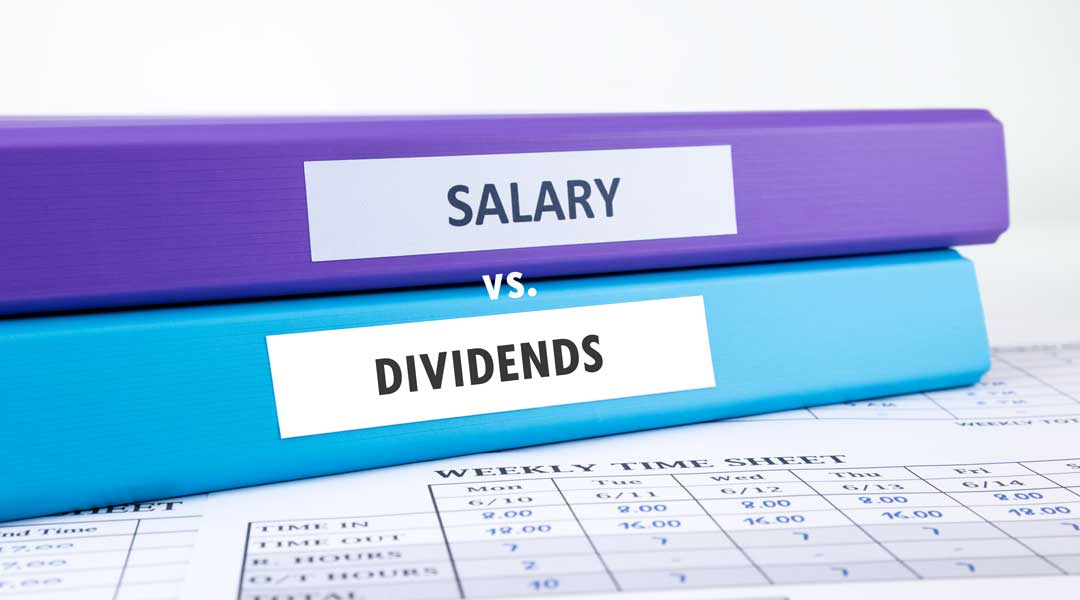
Shareholder Owners Salaries vs Dividends. Which Method is Better for You?
When is it better to pay yourself a salary vs. dividends as the owner/manager of a corporation?
Each method has pros and cons, and as a business owner, you should be aware of your options before deciding on what is better for your unique tax situation and why. The following article will help you understand the difference between your options and why one might be better for your tax situation.
Salary – Pros
- Salary is considered employment income which will increase RRSP contribution room and allow you to contribute to CPP.
- Paying a salary allows the owner to take advantage of certain personal tax deductions, such as childcare expenses.
- When a bonus is declared at year-end, there is an opportunity for personal tax deferral since the salary does not need to be paid for six months.
- Declaring a salary can reduce corporate taxable income and is used in tax planning to decrease income below the $500k small business limit or so the company has nil taxable income.
Salary – Cons
- If the company is considering obtaining financing, it could be affected since a salary would decrease the company’s financial results.
- If a bonus is declared and not paid right away, some people run into issues six months later if they have cash flow issues and cannot pay the bonus at that time.
- Salaries do not have a preferential tax treatment, so they will likely pay more personal tax than if a dividend is declared.
- Paying a bonus or salary comes with a higher cost since you must factor in employer and employee portions of CPP.
- Operating a payroll account involves more compliance costs and hassles.
Dividends – Pros
- Earning dividend income personally has a preferential tax rate.
- If the company is considering obtaining financing for the business, having a higher net profit on the financial statements would be preferable to show potential lenders that the company is more profitable.
- Depending on the year-end of the company, declaring a dividend could provide a personal tax deferral till the personal tax deadline in April.
- It is easier to pay a dividend than a salary (no source deductions required).
- Dividends can be declared anytime, allowing you to optimize your tax situation.
Dividend – Cons
- Earning dividend income does not create RRSP room, nor will you be contributing to CPP.
- Declaring a dividend does not provide a deduction to reduce corporate income.
- The taxpayer would incur a loss on certain personal tax deductions if no salary is earned, such as childcare expenses.
There is no easy answer to which is better between salary and dividends. The answer depends on each taxpayer’s preferences, how much cash you require personally from your company, corporate tax results, personal tax deductions, and retirement planning. If you are struggling to determine which method is best for you or would like assistance analyzing your tax situation, this is where we come in. After assessing your life situation and goals, we can point you in the right direction so you are set for success!
Contact RGB Accounting today at (416) 932-1915 or email us at [email protected] if you are looking for expert advice on shareholder loans. We will get an in-depth understanding of your specific situation and make sure you are set for success!
Other related articles:
Newsletters
Newsletter – February 2020
NewslettersEvents & SponsorshipArticles & Publications
Newsletter – August 2019
NewslettersEvents & SponsorshipArticles & Publications
Newsletter – May 2019
NewslettersEvents & SponsorshipArticles & Publications
Newsletter – April 2019
NewslettersEvents & SponsorshipArticles & Publications
E-Newsletter – February 2019
Events & Sponsorship
No Results Found
The page you requested could not be found. Try refining your search, or use the navigation above to locate the post.
Articles & Publications
Beware of using your corporation’s income to pay personal expenses.
Beware of using your corporation's income to pay personal expenses. Suppose you own an incorporated business or professional corporation. In that case, it can be pretty tempting to pay for various personal expenses out of your corporation's income, but doing so is...
How the principal residence rule works
Principal Residence Rules Since 1982, each family unit (including you, your spouse or common-law partner, and any unmarried kids under the age of 18) has been able to designate one property as its principal residence for each calendar year. To simplify the...
Introducing the new Confirm my Representative service
The new Confirm my Representative service. On October 18, 2021, the Canada Revenue Agency (CRA) is introducing a new, two-step verification process to make authorizing a representative using Represent a Client more efficient and secure. The new process makes it easier...
The future of the COVID aid program
The future of the COVID aid program The CRB is one of three programs (alongside the Canada Recovery Caregiving Benefit and the Canada Recovery Sickness Benefit) that replaced the initial $2,000-per-month Canada Emergency Response Benefit (CERB) in September 2020. The...
RRSP/RRIF and non-registered investments
Drawing from your RRSP/RRIF and non-registered investments. It often helps to think in terms of family wealth and tax efficiency. One of the most asked questions the newly retired or those about to retire have is: "When should I start drawing from my registered...